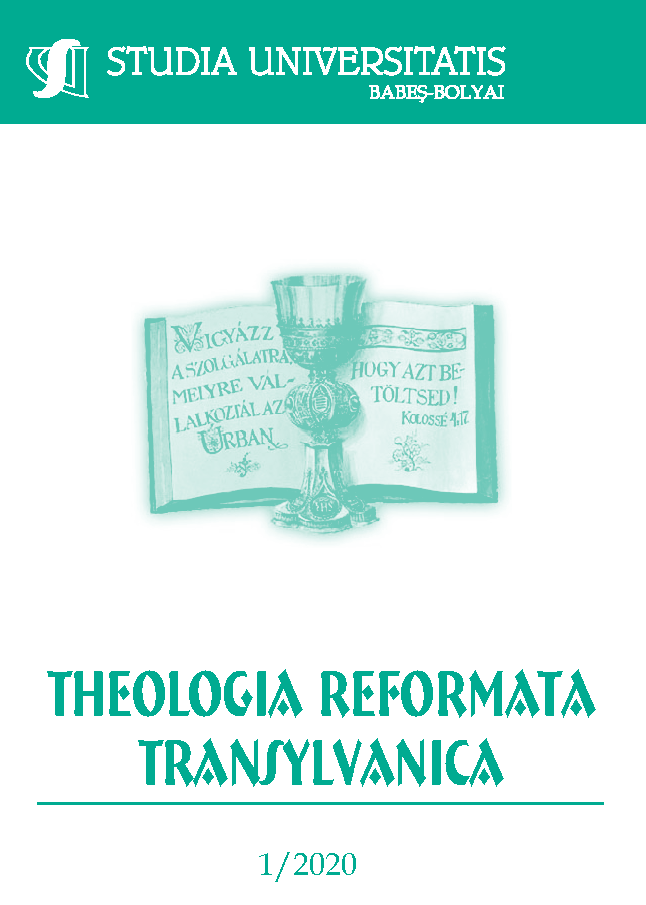Pusztulás, gyász, remény. Bibliai teológiai szempontok a közösséget ért veszteség feldolgozásához
DOI:
https://doi.org/10.24193/subbtref.65.1.03Keywords:
traumas, collapse of societies, biblical theology, history of pre-exilic Judah, JerusalemAbstract
Doom, Grief, Hope. Perspectives of Biblical Theology for Processing Community Loss.
Crisis is an unavoidable part of community and individual life, and traumas can have long-lasting effects on societies. Community loss index is a relatively recent indicator, before introducing it to the sphere of theology, in the present paper, two questions are addressed: (1) is the state of loss indeed necessary?; (2) how is it possible to cope with such a loss or collapse on a theologically acceptable way? We evaluate certain historical events from the perspective of community loss and gain (King Hezekiah of Judah and the Assyrian crisis, the Babylonian exile), with special focus on prophetic pronouncements, sermons (Ezekiel, Jeremiah) and eschatology. The author makes a sharp difference between historical events and their literary representations. As a final word, the necessity of grief as a prerequisite of a successful future is emphasised.
References
ABRAMOVITZ, Mimi – ALRECHT, Jochen: The Community Loss Index: a New Social Indicator, in: Social Service Review, 87. évf., 2013, 4. szám. 677–724. Online: https://www.scie-socialcareonline.org.uk/the-community-loss-index-a-new-social-indicator/r/a1CG00000020QC7MAM (utolsó megtekintés: 2020. január. 14.)
AHLSTRÖM, G. W.: The History of Ancient Palestine from the Palaeolithic Period to Alexander’s Conquest, JSOT Supp. 146., 1993.
ALLEN, Leslie C.: Jeremiah (OTL), Westminster John Knox Press, Louisville. 2008.
BÁCSKAY András: Az ókori Kelet, in: SALAMON K. (szerk.): Világtörténet, Akadémiai kiadó, Budapest, 2006. 84–194.
BARSTAD, H. M.: The Myth of the Empty Land. A Study in the History and Archeology of Judah During the „Exilic” Period, Oslo, Scandinavian University Press, 1996.
BARSTAD, H. M.: After the „Myth of the Empty Land”: Major Challenges in the Study of Neo-Babylonian Judah, in: LIPSCHITS, O. – BLENKINSOPP, J. (szerk.): Judah and the Judeans in the Neo-Babylonian Period, Winona Lake, Eisenbrauns, 2005. 3–20.
BOLING, Robert G.: Judges (AB), Doubleday, Garden City, New York, 1975.
BOWEN, Nancy R.: Ezekiel (Abingdon OT Commentaries), Abingdon Press, Nashville. 2010.
CLINES, David J. A. (szerk.): The Dictionary of Classical Hebrew, 2. kötet, Sheffield Academic Press, Sheffield, 1995.
COGAN, M. – TADMOR, H.: II Kings. A New Translation With Introduction and Commentary (AB 11), New Haven, Yale University Press, 2008.
DALLEY, Stephanie: Recent Evidence from Assyrian Sources for Judaean History from Uzziah to Manasseh, in: Journal for the Study of the Old Testament, 28. évf, 2004, 4. szám. 387–401.
DEARMAN, John: Jeremiah and Lamentations (The NIV Application Commentary), Zondervan, Grand Rapids, MI., 2002.
GADOT, Yuval: In the Valley of the King: Jerusalem’s Rural Hinterland in the 8th-4th Centuries BCE., in: Tel Aviv, 42. évf., 2015, 1. szám. 3–26.
HÁBERMAYER Tamás – MUHORAY Árpád: A krízisek hatása a veszélyhelyzeti tervezésre, in: Bolyai Szemle, 27. évf., 2018, 2. szám. 64–80.
HESS, Richard S.: Israelite Religions. An Archaeological and Biblical Survey, Baker Academic, Grand Rapids, MI., 2007.
HODOSSY-TAKÁCS Előd: Júdeaiak Babilonban: Mindennapok idegenben, in: BODÓ Sára - HOR-SAI Ede (szerk.): „Hiszek az Ige diadalmas erejében!” Tanulmányok Fekete Károly 60. születésnapja alkalmából, Debrecen, Debreceni Református Hittudományi Egyetem, 2020. 135–146.
KHOSLA, Meetu: Need for Coping with Life Crises: Implications for the Quality of Life, in: Journal of the Indian Academy of Applied Psychology, 34. évf., 2008. Különszám. 46–52.
KOMORÓCZY Géza: A babilóni fogság. Egyéni és közösségi stratégiák az identitás megőrzésére kisebbségi helyzetben, in: UŐ.: Bezárkózás a nemzeti hagyományba, Budapest, Osiris, 1995. 210–278.
KNIGHT, G. A. F.: Az Ószövetség keresztyén teológiája, Kálvin kiadó, Budapest, 2006.
MAZAR, Amihai: Archaeology of the Land of the Bible, 10.000–586 B.C.E., Doubleday, New York, 1990.
NIEHAUS, J.J.: Ancient Near Eastern Themes in Biblical Theology. Kregel Publ., Grand Rapids, MI. 2008.
ODED, B.: Judah and the Exile, in: HAYES, H. – MILLER, M. (szerk.): Israelite and Judean His-tory, SCM Press, London, 1977. 435–488.
RAINEY, A.: Hezekiah’s Reform and the Altars at Beersheba and Arad, in: COOGAN, M. D. - EXUM,
J. C. – STAGER, L. E. (szerk.): Scripure and Other Artifacts. Essays on the Bible and Archaeology in Honor of Philip J. King, Westminster John Knox Press, Louisville, 1994. 333–354.
READE, Julian: Assyrian Sculpture, The British Museum Press, London, 2016.
SAGGS, H. W. F.: The Greatness that was Babylon. A Sketch of the Ancient Civilization of the Tigris-Euphrates Valley, A Mentor Book, New York, 1962.
SMITH, Mark S.: The Memoirs of God. History, Memory and the Experience of the Divine in Anci-ent Israel, Fortress Press, Minneapolis. 2004.
Downloads
Published
How to Cite
Issue
Section
License
Copyright (c) 2020 Studia Universitatis Babeș-Bolyai Theologia Reformata Transylvanica

This work is licensed under a Creative Commons Attribution-NonCommercial-NoDerivatives 4.0 International License.






